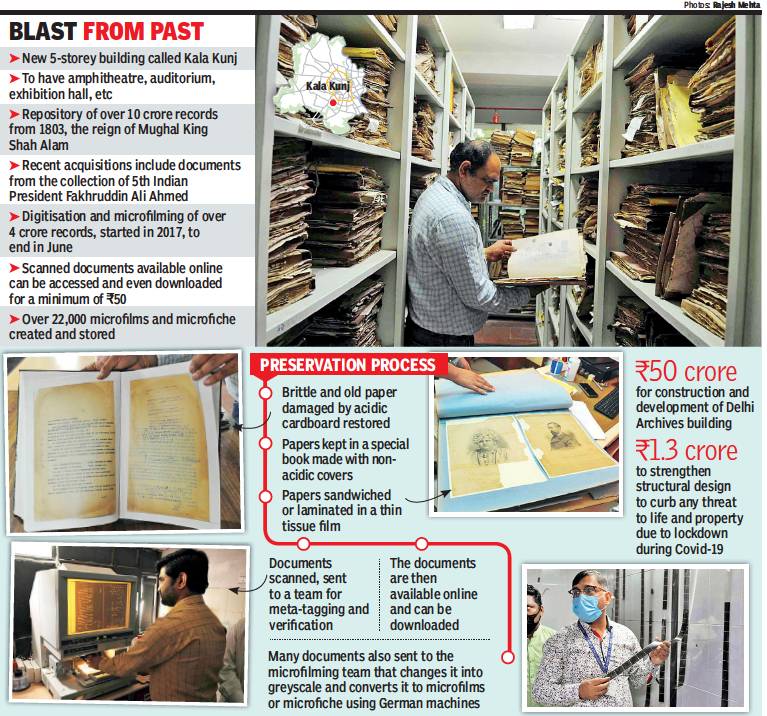Delhi: Archives
This is a collection of articles archived for the excellence of their content. |
As in 2021
Mohammad Ibrar, March 6, 2021: The Times of India

From: Mohammad Ibrar, March 6, 2021: The Times of India
With the announcement of additional funds and a new building for Delhi Archives, a team of over a hundred archivists are happy that their work will now prove of value to citizens. Since 2017, the team has been converting four crore historical documents, dating back to 1803, into digital records and microfilms, a task they hope to finish in a few months.
From conserving paper documents, including old land and revenue records, and the shahi farmans (royal decrees) to repairing and properly storing archival materials, the work of making the past available to those in the future never ceases. The plans for a new building to be called Kala Kunj will give the public access to the repository that has over 10 crore documents.
This week, the council of ministers decided to improve the functioning of Delhi Archives and cleared Rs 50 crore for the construction and development of the archives building. Speaking to TOI, deputy chief minister Manish Sisodia said, “The records in Delhi Archives belong to the people. Besides being used for academic research, the archives is regularly accessed by Delhiites searching for administrative documents, especially those related to property and land ownership. We hope to ease the experience of Delhi citizens through this effort.”
Chief archivist Sanjay Garg had the details. “We have five storeys of storage space for the documents, which are kept at a controlled setting of around 20 degrees Celsius and 45-50 % relative humidity with ventilation and filtration system to remove atmospheric pollutants such as dust, chemicals, and micro-organism,” he said.
When archival materials arrive, those in good condition are sent directly for digitisation. If damages are observed, then the team repairs such documents. The work involves de-acidification of papers, much of which gets discoloured or brittle with time due to acids present in the paper. “We request all government departments to use standard paper quality that resists damage and so helps archiving,” said Garg.
Once a document is repaired, it is sealed between two sheets of polyester film for protective viewing and ease of handling. As Garg explained, “In this way, the documents are safe from human touch and atmospheric elements. The polyester film is waterproof and helps increase the shelf-life of the documents.”
These materials range from revenue and land records or legal documents like Bhagat Singh's trial papers, Delhi gazettes, Punjab government records, contents of private collections such as an old illustrated Bhagwat Gita and maps. There is the blueprint from the 1930s of a railway station at Bijwasan and a map of Farash Khana in old Delhi from the 1960s.
Garg added, “We are using German machines and technologies like SMA 51 Archive writer to create microfilms and microfiches.” These are admissible even in courts of law.
Since January, Delhi Archives has also started two shortterm professional programmes on heritage tour guides and record management-preservation. These courses are part of the plans for Kala Kunj. Sisodia had said last year that this would be a complex with a state-of-the-art auditorium with a capacity of 500 and space for art exhibitions, archives, libraries, café, and would offer a mix of cultural activities.
Swati Sharma, secretary, Delhi Archives, Kala Kunj would provide the sorely needed space for the preservation of documents. “This is a treasure trove that we would like the people of Delhi to know about. The materials connect our past and the future,” said Sharma.
This was part of Delhi government’s commitment to reduce inequities by making knowledge all inclusive, said Abhinandita Mathur, advisor to the state government. “Democratisation of knowledge goes hand in hand with the decentralisation of power,” Mathur asserted.